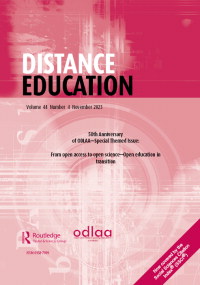使用多模态分析系统研究在线协作解决问题
IF 3.7
1区 教育学
Q1 EDUCATION & EDUCATIONAL RESEARCH
引用次数: 8
摘要
摘要本研究的目的是应用多模式学习分析,系统地调查大学生在网络环境中合作解决问题(CPS)过程中的注意力状态。现有的CPS研究依赖于自我报告的数据,这限制了研究结果的有效性。这项研究通过收集和分析包括脑电图数据、知识测试和视频记录在内的多模式数据,以系统的方式查看数据。研究发现,学生的注意力与他们获得的知识呈正相关。此外,学生的注意力在合作模式的不同条件下也有所不同,因为集中条件下的注意力水平最高。然后应用隐马尔可夫模型,通过识别CPS期间的隐藏状态和状态之间的转换来解释各种条件之间的差异。这项研究的发现为理解和支持在线大学课程中的CPS提供了理论见解和实践启示。本文章由计算机程序翻译,如有差异,请以英文原文为准。
Using multimodal analytics to systemically investigate online collaborative problem-solving
Abstract The purpose of this research was to apply multimodal learning analytics in order to systemically investigate college students’ attention states during their collaborative problem-solving (CPS) in online settings. Existing research on CPS relies on self-reported data, which limits the validity of the findings. This study looked at data in a systemic manner by collecting and analyzing multimodal data including electroencephalogram data, knowledge tests and video recordings. The study found students’ attention was positively correlated to their knowledge gains. Also, students’ attention varied across different conditions of collaborative patterns as the highest attention level was recorded in the centralized condition. A hidden Markov model was then applied to explain the difference across various conditions by identifying both the hidden states and the transitions among the states during CPS. The findings of this research advanced theoretical insights and provided practical implications on understanding and supporting CPS in online college-level courses.
求助全文
通过发布文献求助,成功后即可免费获取论文全文。
去求助
来源期刊

Distance Education
EDUCATION & EDUCATIONAL RESEARCH-
CiteScore
10.70
自引率
6.80%
发文量
29
期刊介绍:
Distance Education, a peer-reviewed journal affiliated with the Open and Distance Learning Association of Australia, Inc., is dedicated to publishing research and scholarly content in the realm of open, distance, and flexible education. Focusing on the freedom of learners from constraints in time, pace, and place of study, the journal has been a pioneering source in these educational domains. It continues to contribute original and scholarly work, playing a crucial role in advancing knowledge and practice in open and distance learning.
 求助内容:
求助内容: 应助结果提醒方式:
应助结果提醒方式:


